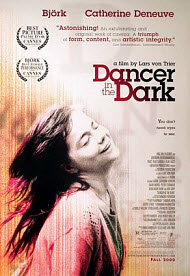Dancer in the Dark
 for some violence.
for some violence.
Reviewed by: Mark Bovill
CONTRIBUTOR
| Moral Rating: | Average |
| Moviemaking Quality: |
|
| Primary Audience: | Adults |
| Genre: | Art Musical Drama |
| Length: | 2 hr. 20 min. |
| Year of Release: | 2000 |
| USA Release: |
October 6, 2000 |
| Featuring |
Björk … Selma Jezkova Catherine Deneuve … Kathy David Morse … Bill Houston Stellan Skarsgård … Doctor Peter Stormare … Jeff Udo Kier … Dr. Porkorny See all » |
| Director |
Lars Von Trier |
| Producer |
Zentropa Entertainments Trust Film Svenska Film i Väst See all » |
| Distributor | Fine Line Features |
“You don’t need eyes to see.”
This film—as with “Breaking the Waves” (which in my opinion is the greatest film of all time)—is not for the faint hearted. It is rated “R” for some relatively brief (but graphic) violence and adult subject matter. In a way I am surprised at the “R” rating (I also thought the “R” rating for “Breaking the Waves” was absurd)—the violence is by no means gratuitous, and there is no sex, and I cannot recall any foul language.
Let it be stated from the outset that “Dancer in the Dark” should only be watched by those who are prepared for heavy subject matter and prepared to confront profound moral issues. This is not the usual fairy floss trash that is mass produced by Hollywood. The viewer who is prepared to accept the “challenge” of “Dancer…” will be well rewarded.
Let it also be stated from the outset that “Dancer in the Dark” is a masterpiece of a film. It received the Cannes Film Festival Palm D’Or and Björk won the Cannes Award for Best Female Performance. For this film, Lars von Trier also co-wrote part of the lyrics to Björk’s musical score.
Interestingly, this movie was inspired by the Danish fairy tale “Gold Heart,” in which a poor girl gives away all her possessions, believing that she would be all right; and indeed, she is rewarded in the end. But to further elaborate on the connection with “Gold Heart” would be to give the whole plot away…
“Dancer” concerns Selma (Björk), a Czech immigrant living in 1964 Washington State with her 12-year-old son, Gene (Vladan Kostic). Selma spends her days working in a factory (where her best friend Kathy also works). Caring nothing for herself, Selma even works briefly on the night shift to scrape together as much money as possible. Selma is gradually going blind, and as the disease is genetic she is fully aware that her beloved son and only child Gene will one day too become blind. Selma has a heart of gold, and is exclusively focused on saving enough money to one day pay for Gene’s operation. Nothing else matters to her apart from attaining this goal.
Selma—aware yet undaunted by the reality that one day her world will no longer consist of sight—finds ineffable joy in musicals. There are many excerpts from the much-loved film “The Sound Of Music”. In fact, Selma herself is rehearsing for the role of Maria in the “The Sound Of Music”. She also uses the outlet of going to the cinema to watch musicals as a means of escapism. But Selma’s passion for music goes far beyond the examples cited above. In many scenes in the film the drudgery and ordinariness of everyday life is transformed by Selma into a wonderful musical where there is never a last song. The scene in the factory where even the dull monotonous clanking and hammering sounds of the machines are transformed into joyous music is particularly brilliant and moving.
I strongly believe that to give away more of the plot does the movie a great injustice. I cannot stress enough that the least you know about the plot of this film the better off you will be. (I went to the film knowing just a little of the plot, but it was enough to give away the entire second half of the film). Having said that, in one sense, as Emily Watson did in “Breaking the Waves”, Björk reduces the plot to irrelevance by her outstanding acting. Holes and jumps in the plot are overlooked, as the audience is held spellbound by the unwavering honesty and integrity of Selma.
As with Emily Watson in “Breaking the Waves”, Björk’s Selma is such the personification of innocence and purity that one is almost forced to leave the cinema to avoid being overcome with emotion. The ending is gut-wrenching, and after the film many patrons were glued to their seats in stunned amazement, while the rest retreated to the bathroom to ball their eyes out.
There are enough Biblical messages here for a entire semester’s Bible study—in fact the movie hints at the very core of Christianity itself (however, once again, to elaborate further is to give the whole story away).
To reiterate: definitely not a movie intended for light entertainment, but I, personally, highly recommended it.
- Profane language: • “For Chr*st’s sakes,” “G*d d*mn,” “Oh God,” “h*ll,” “d*mn”
- Vulgar/Crude language: None
- Nudity: None<
- Sex: None
- Occult: None


—Ed Blank, Tribune-Review of Western Pennsylvania
—Michael Wilmington, Metromix (Chicago Tribune)
—ScreenIt!



I do not believe this is anti-death penalty propaganda, nor do I believe the violent content is any more gratuitous than what you’d see on regular network television. The violence in the film is a parody of violence in film. It’s moral, but not preachy. It’s a good story about honesty versus wickedness, sacrifice versus self-centeredness. The music is sweeping and beautiful. It’s a unique, artistically rendered faerie-tale, on that I wouldn’t be sorry to recommend to Christians and non-Christians alike.